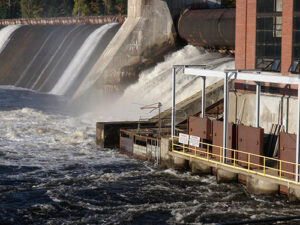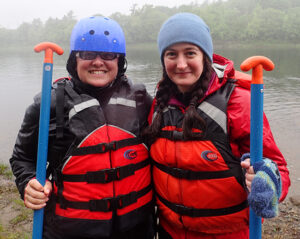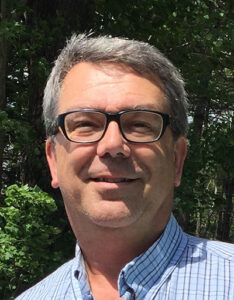Balancing Act
Mitchell Center researchers are developing tools to help stakeholders evaluate different options for hydropower dams

There are close to 200 federally licensed hydropower dams in New England, including more than 50 whose licenses will be considered for renewal in the next decade. As part of the Mitchell Center’s Future of Dams (FoD) project – a collaboration spanning three states and six institutions of higher education – research is underway to help stakeholders evaluate the environmental, social and economic trade-offs that inevitably arise in decisions regarding the potential renewal of hydropower licenses. For example, these dams can serve as an important source of renewable energy, but they often block the passage of sea-run fish.
With more than 50 faculty and graduate students drawn from fields as varied as economics, hydrology, landscape architecture, public policy, engineering, and rhetoric, the FoD team is among the most diverse ever assembled to help improve dam decisions. By examining the many different pieces of the puzzle, they are helping fill information gaps, identify solutions, and reduce unintended consequences of decision-making around dams.

Emma Fox, a Ph.D. candidate in the Ecology and Environmental Sciences Program, and her advisor, Sharon Klein, an Associate Professor in the School of Economics, are focused on a particularly important puzzle piece: How to help stakeholders weigh different decision alternatives, such as expanding hydropower capacity, improving fish passage, continuing to operate the dam as is, or removing it altogether.
Says Klein, “We’ve heard that many stakeholders are seeking a relatively simple way to lay out all the cards on the table in a way that makes it easier to look at all the options.”
Drawing upon their expertise in decision science, energy research, and stakeholder engagement, Fox and Klein are developing a decision support tool based on Multi-Criteria Decision Analysis (MCDA) that can be used by groups of stakeholders to explore different decision alternatives. They are currently focused on decisions regarding dams in the Penobscot River watershed.
The stakeholders who have been involved in dam decisions in the past, and with whom Fox and Klein are working, include federal and state agencies, national and local non-governmental organizations (NGOs), dam operators, tribal governments, local landowners, and other citizens, all of whom want more information about different decision alternatives.
The process of relicensing hydroelectric dams is very opaque to the public. My hope is that the Future of Dams research can pull back the veil and put the public on an equal footing with those who regulate dams on their behalf.
Steven Shepard, U.S. Fish & Wildlife Service (Retired)

“For example, they want to know what all of these decision alternatives cost,” says Fox, “so we’re assembling all of the data we can find to help people look at all of the alternatives together. We also explain how we’re calculating our numbers, because such transparency helps ensure a level playing field during the decision-making process.”
As retired U.S. Fish & Wildlife Service wildlife biologist Steven Shepard explains, “The process of relicensing hydroelectric dams is very opaque to the public. My hope is that the Future of Dams research can pull back the veil and put the public on an equal footing with those who regulate dams on their behalf.”
Stakeholders will use the MCDA tool in an upcoming participatory group workshop. There, they will have the chance to think through tradeoffs between different decision criteria (e.g. fish survival, renewable energy generation, cost) in a transparent and balanced manner, with the ultimate goal of supporting a group ranking of decision alternatives for multiple dams in the Penobscot River watershed.
The upcoming workshop will serve a dual purpose: 1) to get feedback on whether the MCDA tool needs additional adjustments before it’s ready for public release; and 2) to develop and evaluate a group process that can be replicated in multiple ‘real-world’ applications to support more equitable and transparent dam decision processes.
Fox is looking forward to the workshop and figuring out next steps for her dissertation research. What she’s learning is helping her pursue a bigger goal: “I’m doing exactly what I hope to do professionally: designing tools to help incorporate multiple, diverse perspectives in natural resource decision-making. The work we do with stakeholders from all corners is something I’m deeply interested in, and something that the Mitchell Center both encourages and supports.”
Funding for this research is provided by the National Science Foundation (Award #IIA 1539071), the U.S. Geological Survey (Award #G16AP00057), and the U.S. Dept. of Agriculture (Hatch #0230040).
